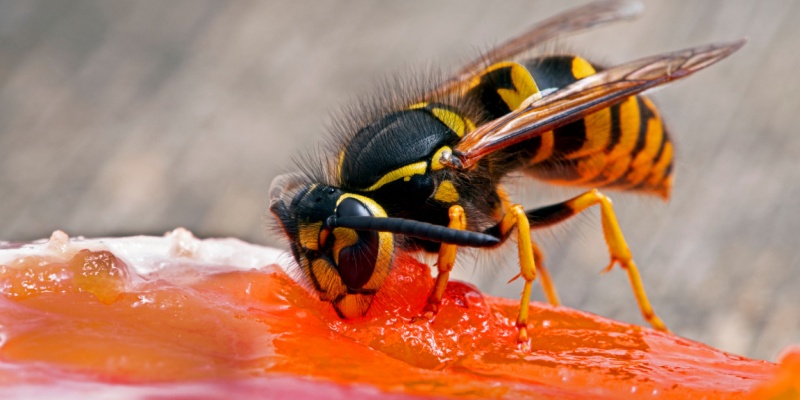Coastal Maine’s beautiful summers invite residents and visitors alike to enjoy outdoor activities, from beach excursions to backyard barbecues. However, these warm months also bring increased activity from stinging insects that can quickly turn outdoor enjoyment into painful encounters. At Atlantic Pest Control, we’ve identified the most common stinging insects in coastal Maine and developed effective strategies to help you avoid unwanted interactions with these pests.
Yellowjackets: The Aggressive Foragers
Identification
Yellowjackets are perhaps the most notorious stinging insects in coastal Maine. These social wasps feature distinctive yellow and black banded patterns and measure approximately 1/2 inch in length. They build papery nests in various locations, including underground in abandoned rodent burrows, inside wall voids, in attics, or in dense vegetation.
Behavior
Yellowjackets are particularly problematic in late summer and early fall when their colonies reach peak population and food sources become scarcer. During this time, they become increasingly aggressive and are attracted to sweet foods, proteins, and garbage at outdoor gatherings. Unlike some other stinging insects, yellowjackets can sting repeatedly, making encounters potentially dangerous.
Avoidance Strategies
- Keep food and drinks covered when dining outdoors
- Secure garbage in containers with tight-fitting lids
- Avoid wearing sweet-smelling perfumes or brightly colored clothing
- Fill in ground holes that could serve as nesting sites
- Maintain a distance if you spot yellowjacket activity
- Consider professional removal for nests near living areas
Paper Wasps: The Open-Nest Dwellers
Identification
Paper wasps are slender insects measuring about 3/4 to 1 inch long with brown and yellow or black markings. They construct umbrella-shaped, open-cell paper nests that hang from a single stalk, typically attached to eaves, deck joists, window frames, or other sheltered locations around homes.
Behavior
Generally less aggressive than yellowjackets or hornets, paper wasps will typically only sting when their nest is directly threatened. They feed primarily on nectar and insects, making them beneficial for garden pest control. Paper wasps are often the first stinging insects to appear in spring, with queens emerging from hibernation to start new colonies.
Avoidance Strategies
- Inspect your home’s exterior regularly in early spring to remove starter nests
- Apply wasp-deterring products to areas where paper wasps frequently build
- Seal gaps and cracks in eaves, soffits, and other potential attachment points
- Maintain a safe distance from established nests
- Consider professional removal for nests near doorways or high-traffic areas
- Remove old nests during winter to discourage new construction in the same location
European Hornets: The Nocturnal Giants
Identification
European hornets are the largest wasps in Maine, measuring up to 1 1/2 inches long. They have brown bodies with yellow markings and reddish-brown faces. Their large paper nests are typically built in hollow trees, wall voids, attics, and outbuildings.
Behavior
Unlike most stinging insects, European hornets are often active at night and are attracted to lights. They are less aggressive than yellowjackets when away from their nest but will defend their colony vigorously if threatened. European hornets feed on large insects, tree sap, and fruit, occasionally causing damage to ornamental plants and trees.
Avoidance Strategies
- Reduce outdoor lighting that might attract hornets at night
- Seal potential entry points into buildings
- Handle fallen fruit promptly to avoid attracting foraging hornets
- Listen for buzzing sounds in walls or ceilings that might indicate a nest
- Contact professionals for removal of nests found in or near structures
- Maintain a safe distance if you encounter these large insects
General Prevention Tips for All Stinging Insects
Around Your Home
- Seal cracks and gaps in home exteriors
- Install fine mesh screens over vents and openings
- Keep outdoor eating areas clean and food covered
- Maintain garbage cans with tight-fitting lids
- Reduce standing water that attracts insects seeking moisture
- Trim vegetation away from structures
Personal Protection
- Avoid wearing sweet-smelling perfumes, colognes, or scented body products outdoors
- Choose unscented soaps, shampoos, and laundry detergents
- Wear light-colored clothing (stinging insects are attracted to bright colors)
- Avoid floral patterns that may be mistaken for flowers
- Cover food and drinks when outdoors
- Stay calm and move slowly if stinging insects are nearby
When to Call Atlantic Pest Control
Consider professional assistance from Atlantic Pest Control when:
- You discover multiple stinging insect nests on your property
- Nests are located near entrances, playscapes, or high-traffic areas
- You or family members have allergies to insect stings
- DIY removal attempts have been unsuccessful
- You notice recurring stinging insect problems each year
- Stinging insects have entered your home’s structure
Our experienced technicians can safely identify and remove stinging insect nests while providing recommendations to prevent future problems. With Atlantic Pest Control’s help, you can enjoy coastal Maine’s beautiful outdoor spaces without the worry of painful stinging insect encounters.
